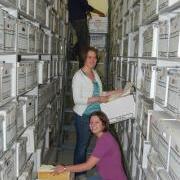By Sarah Quigley, Project Archivist, Southern Christian Leadership Conference records, MARBL
 “Working for Freedom: Documenting Civil Rights Organizations” is a collaborative project between Emory University's Manuscript, Archives and Rare Book Library, The Auburn Avenue Research Library on African American Culture and History, The Amistad Research Center at Tulane University, and The Robert W. Woodruff Library of Atlanta University Center to uncover and make available previously hidden collections documenting the Civil Rights Movement in Atlanta and New Orleans. The project is administered by the Council on Library and Information Resources with funds from the Andrew W. Mellon Foundation. Each organization regularly contributes blog posts about their progress.
“Working for Freedom: Documenting Civil Rights Organizations” is a collaborative project between Emory University's Manuscript, Archives and Rare Book Library, The Auburn Avenue Research Library on African American Culture and History, The Amistad Research Center at Tulane University, and The Robert W. Woodruff Library of Atlanta University Center to uncover and make available previously hidden collections documenting the Civil Rights Movement in Atlanta and New Orleans. The project is administered by the Council on Library and Information Resources with funds from the Andrew W. Mellon Foundation. Each organization regularly contributes blog posts about their progress.
The records of the Southern Christian Leadership Conference were acquired by Emory University’s Manuscript, Archives, and Rare Book Library (MARBL) in 2007. When MARBL received the CLIR Cataloging Hidden Special Collections and Archives grant in 2009, I was hired to manage the processing of the collection. Over the past year, my team has made great strides toward fully arranging and describing this significant collection. I’ve been fortunate to spend these months working with an amazing group of graduate students who have dedicated themselves to making this collection available for research: Becky Sherman, Michael Hall, Danica Tisdale and Brenda Tindal.
Becky is a Ph.D. student in the History Department studying early 20th Century women’s history. Michael is also a Ph.D. student, studying in the Institute of the Liberal Arts and researching African American tourism and travel. The project also has benefitted tremendously from the Woodruff Library Fellowship program. From May 2009-June 2010, Danica Tisdale, a Ph.D. candidate in the Women’s Studies department, worked with the project, and just this week we welcomed a new Fellow, Brenda Tindal, who is also a Ph.D. candidate in the ILA. Brenda joins the SCLC team having spent the last year helping process the papers of Andrew Young at the Auburn Avenue Research Library, another member of the “Working for Freedom” collaborative. These students have contributed their diverse experiences and specialties, incredible talents, and insights to this project, helping me meet and overcome challenges each day. Their participation has made the first year of this project a rewarding and productive experience.
As a team, we’ve accomplished a great deal in 15 months. We’ve processed 340 linear feet of material, nearly completing processing on the records of the Office of the President, the Office of the Executive Vice President, the Office of the Executive Director and National Administrator, and the radio program Martin Luther King Speaks. Additionally, within the next several weeks, Michael will finish inventorying the collection’s audio/visual material. By the end, he will have listened to or viewed nearly 1000 sound recordings and videos.
While processing, we’ve discovered wonderful treasures in this collection. Within the transcripts for episodes of Martin Luther King Speaks, Becky has found speeches and interviews from fathers of the Civil Rights Movement, including Ralph David Abernathy and Andrew Young, and also from activists in the Women’s Movement such as Florynce Kennedy and Pauli Murray. We’ve also uncovered records documenting SCLC’s anti-drug program Wings of Hope, planning files for various marches and rallies for economic justice in the 1980s, and evidence of SCLC’s involvement with the youth community of Atlanta.
| Above: Progress! |
As Project Archivist, I’ve also had the opportunity to travel and speak about the work we’re doing on the collection, from innovative methods of project management to using collaborative tools to process and promote Civil Rights archives. In August, archivists from each of the four “Working for Freedom” member institutions gave a panel presentation on the collaborative to the annual meeting of the Society of American Archivists. The panel was well attended and descriptions of our projects generated a lively and interesting discussion with the audience.
Though the project is moving swiftly, the collection will remain closed to researchers until it has been completely processed. We anticipate that the records will be available in 2012. We’ve had a wonderful first year, and I know we’re all looking forward to another one.

